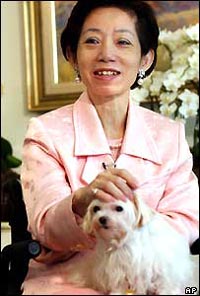Taiwan president says prosecutors treating him unfairly
Taiwan President Chen Shui-bian said Tuesday that prosecutors who have indicted his wife on embezzlement charges are unfairly making links between a secret diplomatic fund and corruption.

Chen's comments came as Taiwanese lawmakers voted to put a measure calling for a referendum to oust the president onto the legislative calendar, paving the way for a showdown on the issue before the end of the month.
The new attempt to topple the president threatened to prolong the political squabbling and uncertainty that have gripped one of Asia's youngest democracies for the past six months. A vote on the recall motion was expected later this month.
Speaking to a group of overseas Chinese in Taipei, Chen chided prosecutors for asserting that his failure to produce receipts to back up expenditures for a fund used to sustain Taiwanese diplomatic work abroad was illegal.
The fund was at the heart of a three-month long corruption probe involving Chen, his wife, and three former aides of the president.
"To link the funds for secret diplomatic work directly with corruption is really unfair," Chen told a group of overseas Chinese in Taipei.
"All the funds were used for state affairs, not one dollar entered private pockets," he said.
On Friday prosecutors indicted Chen's wife on charges of embezzlement in connection with the fund, and said that Chen himself could also face indictment once he leaves office. Chen enjoys immunity while he remains at this post. His second four-year term ends in 18 months.
The president tried to rally his supporters on Sunday with a televised address saying that he and his wife were innocent. He said any irregularities in his spending or expenses were due to the confusing and often conflicting regulations for the diplomacy fund.
Chen also pledged to resign if his wife was convicted, and he promised not to appeal any decision.
In Tuesday's vote on the recall issue, lawmakers decided along party lines to consider whether to authorize a full debate on a recall motion. Approval is expected on Friday, with a final vote on recall likely in the last week of November.
The final vote would likely fail without about 15 votes from the from the DPP, because the measure needs a two-thirds majority of Taiwan's 220-seat Legislature, and the opposition parties and their traditional allies control only 120 seats.
On Friday the 12 member Taiwan Solidarity Union said they would defect to the opposition on the recall vote, but under heavy pressure from constituents many of whom are strongly pro-Chen they appear to be wavering.
On Tuesday lawmaker Hou Tsai-feng of the opposition Nationalist Party acknowledged that recalling the president was a long shot.
"Because recent newspaper polls show over 51 percent want Chen to step down, as an opposition party it's our duty to propose the recall motion, even though it is unlikely to pass," she said.
Tsai Huang-liang, a high-ranking DPP official, said the party leadership would meet soon to discuss how to punish lawmakers who vote for the recall measure, reports AP.
"We hope in the future that all of the lawmakers will unite and vote together. This is the best way for the DPP to get through this challenge."
The president has been under heavy pressure for the past six months over a series of corruption scandals involving his wife and inner circle. Previous opposition sponsored recall motions against him failed in June and again last month.
Subscribe to Pravda.Ru Telegram channel, Facebook, RSS!





